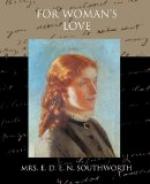The travelers were hospitably received by the pioneers, and here, as the autumn was far advanced, and travel difficult, they determined to halt for the winter, at least, and in the spring to go farther south in search of Scythia’s tribe, the Nez Percees, who had been moved away from their former hunting grounds.
They were feasted and lodged by the hutters that night. The next morning the men turned out in a body, felled trees and cleared a spot on the slope of a wooded hill, sawed logs and built two huts, one for Rothsay, and one for old Scythia. They were finished before night. And then the settlers had a house-warming, which was a breakdown dance to the music of the one fiddle in the settlement, and a supper of such eatables and drinkables as the place could afford.
But there was no furniture in these two primitive dwellings. So once more these wayfarers had each to sleep on a bed of leaves.
On the second day the man who owned the only mule and cart, and was the only expressman and carrier to the settlement, offered to go to the nearest post trader’s station—a distance of fifty miles—and purchase anything that the strangers might need, if said strangers had the money to buy.
Rothsay had money in notes, hardly thought of, and never looked at, except when, on their long journey, he had to take out his pocket book to pay for accommodations at some log cabin, or to purchase a change of under clothing at some post trader’s.
Also old Scythia had a pouch of silver and gold coin, saved from the money that had been regularly sent to her by Rule from the time when he first began to earn wages to the time when they set out for the wilderness in company.
Of this money they gave the frontier expressman all that he required to purchase the plainest furniture for the log cabins—bedding, cooking utensils, crockery ware, and some groceries.
“Yer can’t buy bed or mattresses at the post trader’s; but yer can buy ticking, and we can sew it up for yer, and the men will stuff with straw. There’s plenty of straw,” said one of the kindly women, speaking for all her neighbors.
And the expressman set out with his list.
In three days he was back again with a satisfactory supply. The women made the straw beds and pillows and hemmed the sheets. The men filled the ticks and “knocked together” a pine table and a few rude, three-legged stools. And so Rothsay and old Scythia were settled for the winter.
Rothsay took upon himself the office of teacher and preacher. Among the articles brought from the post trader’s were a few Bibles, hymn books, and elementary school books, slates and pencils.
He began his labors by holding a religious service in his own cabin on the first Sabbath of his sojourn at La Terrepeur, which—perhaps for its rarity—was attended by the whole of the little community. And on the next day he opened his little school in his hut, where he taught the children all day, and where he slept at night. Old Scythia’s cabin was kitchen and dining room.




